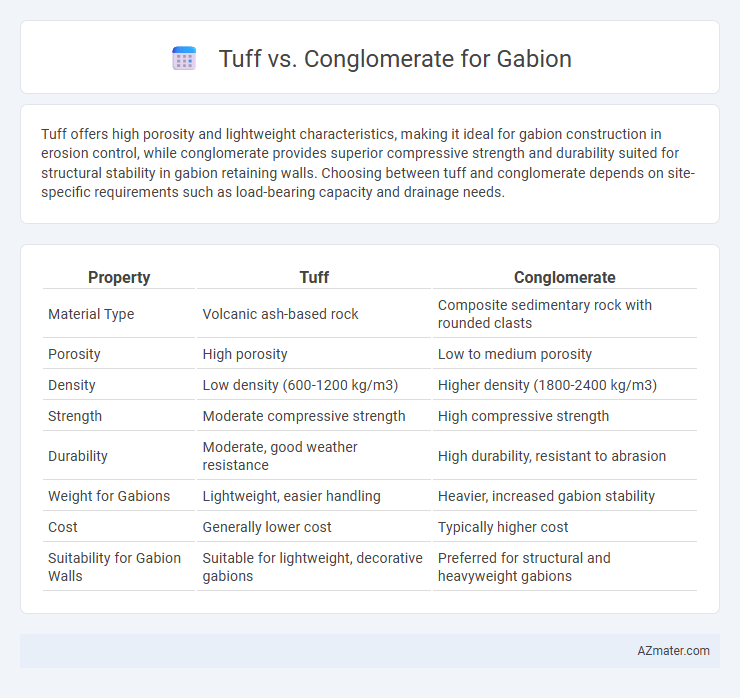Tuff offers high porosity and lightweight characteristics, making it ideal for gabion construction in erosion control, while conglomerate provides superior compressive strength and durability suited for structural stability in gabion retaining walls. Choosing between tuff and conglomerate depends on site-specific requirements such as load-bearing capacity and drainage needs.
Table of Comparison
| Property | Tuff | Conglomerate |
|---|---|---|
| Material Type | Volcanic ash-based rock | Composite sedimentary rock with rounded clasts |
| Porosity | High porosity | Low to medium porosity |
| Density | Low density (600-1200 kg/m3) | Higher density (1800-2400 kg/m3) |
| Strength | Moderate compressive strength | High compressive strength |
| Durability | Moderate, good weather resistance | High durability, resistant to abrasion |
| Weight for Gabions | Lightweight, easier handling | Heavier, increased gabion stability |
| Cost | Generally lower cost | Typically higher cost |
| Suitability for Gabion Walls | Suitable for lightweight, decorative gabions | Preferred for structural and heavyweight gabions |
Introduction to Gabion Materials
Tuff and conglomerate are common natural stone materials used in gabion construction, each offering distinct properties that influence durability and stability. Tuff, a volcanic rock, is lightweight and porous, providing good thermal insulation but lower compressive strength compared to conglomerate. Conglomerate consists of cemented gravel and pebbles, delivering superior strength and resistance to weathering, making it ideal for structural gabions in erosion control and retaining walls.
What is Tuff?
Tuff is a type of volcanic rock formed from consolidated volcanic ash ejected during explosive eruptions, characterized by its porous texture and relatively low density compared to conglomerate. It is often favored in gabion construction for its lightweight properties and ease of shaping, which enhances structural stability without adding excessive weight. Unlike conglomerate, which consists of rounded pebbles cemented together and offers higher density and durability, tuff provides better insulation and drainage properties in gabion walls.
What is Conglomerate?
Conglomerate is a coarse-grained sedimentary rock composed of rounded clasts cemented together by finer materials such as sand, silt, or clay. It differs from tuff, which is an igneous rock formed from volcanic ash and debris that have been compacted and cemented. In gabion construction, conglomerate's naturally durable and weather-resistant properties offer distinct advantages for stability and longevity compared to tuff's more porous and less consistent composition.
Physical Properties Comparison: Tuff vs Conglomerate
Tuff exhibits lower density and higher porosity compared to conglomerate, resulting in better water absorption but reduced strength and durability for gabion applications. Conglomerate features larger grain sizes and stronger cementation, offering superior compressive strength and resistance to weathering, essential for structural stability in gabion walls. The physical properties of tuff make it suitable for lightweight, non-load-bearing gabion structures, while conglomerate's robust nature supports heavy-duty, long-lasting gabion installations.
Durability and Weather Resistance
Tuff, a volcanic rock with high porosity, tends to absorb water, resulting in lower durability and reduced weather resistance when used in gabions. Conglomerate, composed of cemented gravel and sediment, offers superior durability and better weather resistance due to its dense and compact structure. For long-lasting gabions exposed to harsh weather conditions, conglomerate is generally the more reliable choice.
Aesthetics and Visual Appeal
Tuff offers a consistent, textured appearance with warm earthy tones that enhance the natural aesthetic of gabion structures, creating a visually appealing and harmonious blend with outdoor environments. Conglomerate displays a varied color palette and irregular patterns due to its mixed rock composition, providing a rugged, dynamic look that adds character and uniqueness to gabions. Selecting tuff improves uniformity and subtle elegance, while conglomerate emphasizes visual diversity and raw natural beauty.
Cost and Availability Analysis
Tuff, being a volcanic rock, is generally more abundant and cost-effective compared to conglomerate, which is a sedimentary rock composed of varied materials, making it less consistent in availability and often more expensive. The cost difference arises because tuff requires less processing and is widely quarried in volcanic regions, reducing transportation and extraction expenses. For gabion construction, selecting tuff can significantly lower overall project costs while ensuring material availability, whereas conglomerate may demand higher procurement efforts and budget allocation.
Environmental Impact and Sustainability
Tuff, a volcanic rock with lower density and higher porosity, offers superior environmental benefits for gabion construction due to its natural local availability and reduced carbon footprint during extraction and processing. Conglomerate, while durable, typically requires more intensive quarrying and transportation efforts, resulting in higher energy consumption and ecological disturbance. Choosing tuff for gabions enhances sustainability by promoting resource efficiency and minimizing habitat disruption in comparison to conglomerate materials.
Suitability for Gabion Applications
Tuff offers excellent suitability for gabion applications due to its lightweight nature and natural porosity, which enhances drainage and reduces pressure buildup. Conglomerate, being denser and more durable, provides superior structural stability and resistance to weathering, making it ideal for high-load gabion walls. The choice between tuff and conglomerate hinges on environmental conditions and project requirements, balancing weight, drainage, and strength for optimal gabion performance.
Conclusion: Choosing the Right Stone for Gabions
Tuff offers excellent durability and lightweight properties, making it ideal for easy handling and long-term stability in gabion construction. Conglomerate provides superior compressive strength due to its naturally cemented composition, ensuring enhanced structural support in heavy load applications. Selecting between tuff and conglomerate depends on project-specific needs, balancing factors like weight, strength, weather resistance, and budget for optimal gabion performance.

Infographic: Tuff vs Conglomerate for Gabion
 azmater.com
azmater.com